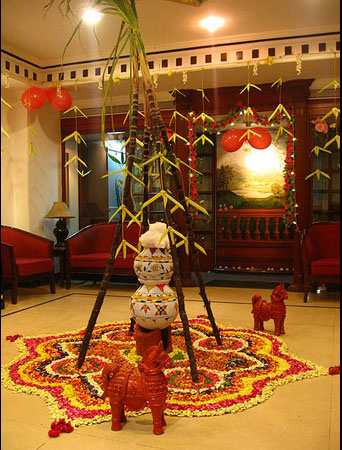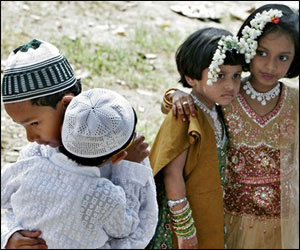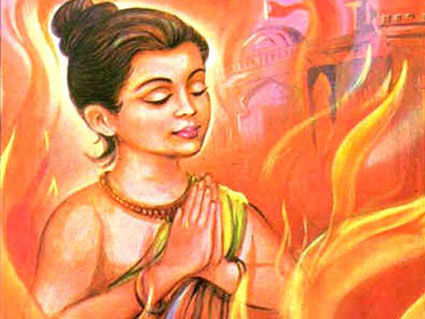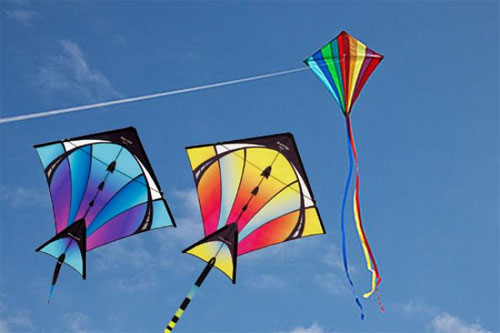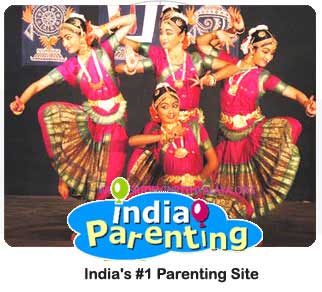Pongal festival is celebrated in Tamil Nadu, which is in the southern part of India. Pongal is a four-day festival which is known as the celebration of prosperity. Pongal festival falls on the 14th or 15th of January every year. Read on to find more about the significance of Pongal festival and how Pongal is celebrated in Tamil Nadu.The oldest and primary occupation of Indians is agriculture and farmers celebrate change of seasons with full fun and excitement. The names vary from place to place but the intention remains the same throughout India. This is the reason why when celebrating the festival they wear traditional dresses and prepare traditional food items as well. Pongal is celebrated in January and is the harvest festival of south India. The festival of Pongal is celebrated as people welcome the spring season and the beginning of the end of winter season. This festival is usually celebrated from January 12 - January 15, and the Pongal day is January 14. The date of Pongal remains unchanged as it follows the sun calendar. It is like a thanks giving festival in which people thank Sun God for the good harvest that they received in the past year. In this article Common Traditions Followed on Pongal Festival Celebration of PongalCommon Traditions Followed on Pongal Festival People clean their houses and wear new clothes on the Pongal day. Men, women and girls and boys wear their traditional dresses respectively on this day. People decorate their houses and make Kolams (beautiful drawings with white powder made of rice) on their doorsteps. Nowadays, different colours are also used to make it look all the more beautiful and attractive. People also decorate their houses with garlands and leaves of banana tree. Another custom that is followed on Pongal day is exchange of gifts. In villages the labourers get gifts from the farm owner. Most of the popular gift items used on this festival is wooden handicraft items, household goods and new kitchen vessels. Temples and houses are decorated and sweets that are mainly prepared with rice are distributed and offered to God as well. Celebration of Pongal The first day of the Pongal festival is called Bhogi Pongal and is celebrated honouring Lord Indra who is the lord of rains. The second day is dedicated to God Surya and various cultural activities are carried out on this day. The third day is devoted to Lord Ganesha and Goddess Parvathi and is known as Mattu Pongal. On this day cattle are washed and their horns are coloured. The fourth day is called Kaanum Pongal and people visit friends and relatives on this day. Just a day before Pongal, people create a big bonfire in front of their houses and throw away useless things into it. With this they promise themselves to welcome the New Year with good things. The fire burns whole night and young boys and people enjoy merry making around the fire. A typical food item that is prepared on this day is also known as Pongal. In some places community dinner is also organized and people get a good chance to interact socially. Thanking God and celebrating with excitement and enjoyment is the base of almost every Indian festival. Although there is huge diversity in cultural beliefs and people are different in different states, the way all celebrate the festivals is really worth enjoying. Since all the festivals are celebrated with seasons and farming profession keeping in mind, many people still follow the old traditions even though they live in urban areas. Worshipping different gods and cattle depicts that the farmers want to give thanks to everything that supported and helped them have a good harvest. The festival is very important for farmers.
Pongal festival is celebrated in Tamil Nadu, which is in the southern part of India. Pongal is a four-day festival which is known as the celebration of prosperity. Pongal festival falls on the 14th or 15th of January every year. Read on to find more about the significance of Pongal festival and how Pongal is celebrated in Tamil Nadu.The oldest and primary occupation of Indians is agriculture and farmers celebrate change of seasons with full fun and excitement. The names vary from place to place but the intention remains the same throughout India. This is the reason why when celebrating the festival they wear traditional dresses and prepare traditional food items as well.
Pongal is celebrated in January and is the harvest festival of south India.
The festival of Pongal is celebrated as people welcome the spring season and the beginning of the end of winter season. This festival is usually celebrated from January 12 - January 15, and the Pongal day is January 14. The date of Pongal remains unchanged as it follows the sun calendar. It is like a thanks giving festival in which people thank Sun God for the good harvest that they received in the past year.
Common Traditions Followed on Pongal Festival
People clean their houses and wear new clothes on the Pongal day. Men, women and girls and boys wear their traditional dresses respectively on this day. People decorate their houses and make
Kolams (beautiful drawings with white powder made of rice) on their doorsteps. Nowadays, different colours are also used to make it look all the more beautiful and attractive. People also decorate their houses with garlands and leaves of banana tree.
Another custom that is followed on Pongal day is exchange of
gifts. In villages the labourers get gifts from the farm owner. Most of the popular gift items used on this festival is wooden handicraft items, household goods and new kitchen vessels. Temples and houses are decorated and sweets that are mainly prepared with rice are distributed and offered to God as well.
Celebration of Pongal
The first day of the Pongal festival is called Bhogi Pongal and is celebrated honouring Lord Indra who is the lord of rains. The second day is dedicated to
God Surya and various cultural activities are carried out on this day. The third day is devoted to Lord Ganesha and Goddess Parvathi and is known as Mattu Pongal. On this day cattle are washed and their horns are coloured. The fourth day is called Kaanum Pongal and people visit friends and relatives on this day.
Just a day before Pongal, people create a big bonfire in front of their houses and throw away useless things into it. With this they promise themselves to welcome the New Year with good things. The
fire burns whole night and young boys and people enjoy merry making around the fire. A typical food item that is prepared on this day is also known as Pongal. In some places community dinner is also organized and people get a good chance to interact socially.
Thanking God and celebrating with excitement and enjoyment is the base of almost every
Indian festival. Although there is huge diversity in cultural beliefs and people are different in different states, the way all celebrate the festivals is really worth enjoying. Since all the festivals are celebrated with seasons and farming profession keeping in mind, many people still follow the old traditions even though they live in urban areas. Worshipping different gods and cattle depicts that the farmers want to give thanks to everything that supported and helped them have a good harvest. The festival is very important for farmers.












